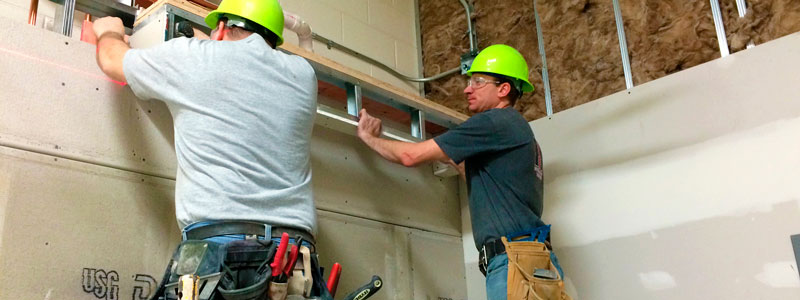In fact, the construction and residential building sector has been the fastest growing industry for small businesses in recent years (source: Sageworks) thanks to increased demand for housing, lending activity and real estate values.
The construction business is booming once again.
Additionally, six of the top 10 fastest growing industries among small businesses are tied to construction – including contractors, real estate agents and architects.
The commercial construction market is also experiencing a rebound. IBISWorld predicts the next five years to see a robust growth period for commercial construction companies. The demand for more commercial office space and the resurgence of disposable income will also increase the demand for commercial buildings.
If you are interested in moving into construction, now is the time. Here are ten considerations and resources that can help you get started.

10 steps to start a construction or general contracting business
Begin by familiarizing yourself with the basic steps involved in planning and forming any type of business, including planning your business strategy, incorporating, and registering with the appropriate government agencies. These 10 Steps to Starting a Business should cover everything you need to know.
1.- Get help and receive guidance
You don’t have to do it alone; small business assistance programs such as SCORE mentors or your local Small Business Development Center or Women’s Business Centers can help you understand the ins and outs of the planning process and offer tips to get you started. SCORE can even match you with a construction industry mentor, free of charge. If you are a veteran, contact your Veterans Business Outreach Center. They offer workshops, tutoring, and financial advice.
If you need help writing a business plan, check out the step-by-step online business planning tool from SBA.
2.- Access financing
If you don’t have savings or access to a traditional bank loan, you may want to consider a loan program. Other financing options for small businesses include credit unions, community banks, or a business line of credit.
3.- Obtain the license, bond and insurance
Protect yourself, your business, and your customers by ensuring you have the proper licenses and permits, business insurance, and surety bonds. Here are three reasons why and information on how to get them:
- 4.- Business licenses and permits – In addition to a general business license, most construction or contracting businesses need specific licenses to operate. For example, a merchant’s license is required for electrical, plumbing, HVAC, gas installation and other construction trades. Check with the your state licensing office for information on what you will need. If you have your home office outside your home, you will also need to obtain a home business permit from your city or county.
- 5.- Guarantee bonds – Typically, construction companies need construction bonds in order to operate legally, you arrange to obtain a surety bond from a third party that promises to pay your client if you fail to fulfill your employment obligations under a contract. Learn more about surety bonds from the Surety & Fidelity Association of America and take a look at your linkage resources for small and emerging contractors. Bond regulations vary by state, so research your state’s requirements or speak with a reputable surety bond agent. If you are unable to secure a bond through a commercial channel, SBA offers its own Safety Bond Guarantee Program.
7.- Familiarize yourself with the regulations of the construction industry
From energy efficiency standards to workplace safety regulations, the construction industry is heavily regulated. Read the Construction Industry Guide for more information.
8.- Develop an occupational health and safety plan
The Occupational Safety and Health Act (OSHA) requires construction workers to have a safe workplace free from recognized hazards. Take a look at the Guide to Safety and Health in the Workplace for information on resources that can help you establish a safe and compliant workplace.
9.- Find and hire adequate labor
The construction industry generally secures labor from four sources – subcontractors, hired employees, job brokers or independent contractors. For you to start, read the guide on how to hire your first employee And then check the particular laws and tax ramifications of hiring independent contractors.
10.- Take advantage of online industry tools and resources
There are many resources online that can help small construction companies and contractors who cannot afford the staff or infrastructure that larger companies enjoy. Here are just a few:
- Construction Office Online – Includes free downloadable templates and documents such as schedules, quotes, estimates, timesheets, billing and billing and more
- Compare Construction Business Software – Looking for the right construction management solution? This guide lists the “Top 10 Building Systems Reviewed”
- Construction Marketing Association Blog – Tips and Advice on How to Market Your Business Like a Pro
- Overcoming Obstacles: Best Practices for Subcontractors, General Contractors and Public Agencies For more information on some general topics related to doing business in the construction industry such as cash flow, communication between contractors, change order processing, contract negotiations and more.
